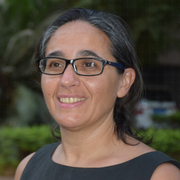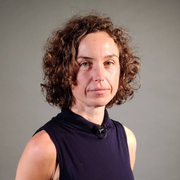- Level Foundation
- المدة 14 ساعات hours
- الطبع بواسطة Universitat Autònoma de Barcelona
-
Offered by

عن
Climate change is a global phenomenon, but its impacts vary among different social groups, who perceive and adapt to climate change impacts in different ways. In this course, you will: a) understand the different debates around climate change impacts on Indigenous Peoples and local communities (IPLC); b) familiarize yourself with different impacts of climate change on IPLC, with the IPLC understanding of climate change impacts and with their strategies to adapt to climate change; and c) learn about different strategies to incorporate Indigenous peoples and local communities in climate change research and policy. The course includes a theoretical and a methodological component, through which you will learn methodologies to conduct research on Indigenous Peoples and local communities’ perceptions of climate change impacts.الوحدات
Course Overview and welcome
1
Videos
- Welcome to the course
How the course works
5
Readings
- Course organization
- About the course certificate
- Solving doubts and technical issues
- FAQs - General topics
- FAQs - Assessments and Certificate
Videos
7
Videos
- Introduction to the week
- Climate change as a natural and anthropogenic phenomena
- The multiple evidences of climate change
- Indigenous peoples and local communities: who, what, where
- Local knowledge systems
- Differences and synergies between Local Ecological Knowledge and scientific knowledge
- The potential of local knowledge to understand climate change
Readings
3
Readings
- Connecting Diverse Knowledge Systems for Enhanced Ecosystem Governance: The Multiple Evidence Base Approach
- Climate Change 2014. Synthesis Report. Summary for Policymakers
- Linking Indigenous and Scientific Knowledge of Climate Change
Evaluate your knowledge
1
Assignment
- Quiz 1
Readings (optional)
4
Readings
- Observations of climate change among subsistence-oriented communities around the world
- A spatial overview of the global importance of Indigenous lands for conservation
- Local indicators of climate change: the potential contribution of local knowledge to climate research
- Climate Change 2014: Synthesis Report
Videos
6
Videos
- Introduction to the week
- Introduction: Understanding climate change impacts on indigenous communities
- Climate change impacts on physical systems and their consequences for Indigenous People and Local Communities
- Climate change impacts on the biological system: local perceptions of changes in living organisms
- Climate change impacts on indigenous resource management systems
- Climate change impacts on indigenous health and well being
Readings
2
Readings
- Indigenous peoples and climate change
- Unexpected climate impacts on the Tibetan Plateau: Local and scientific knowledge in findings of delayed summer
Evaluate your knowledge
1
Assignment
- Quiz 2
Readings (optional)
4
Readings
- The impact of climate change on the well-being and lifestyle of a First Nation community in the western James Bay region
- The impacts of climate change on human health in the United States
- An IPCC Special Report on ocean and cryosphere in changing climate
- An IPCC Special Report on climate change, desertification, land degradation, sustainable land management, food security, and greenhouse gas fluxes in terrestrial ecosystems
Videos
8
Videos
- Introduction to the week
- Introduction 1/2: Understanding adaptation to climate change
- Introduction 2/2: From the local to the global: Classifying local responses to climate change
- Adaptation strategies, example 1/3: Mobility as adaptation in pastoral systems
- Adaptation strategies, example 2/3: Diversification as adaptation in agricultural systems
- Adaptation strategies, example 3/3: Learning from the past: Multilevel adaptation to drought in early modern Spain
- Indigenous Peoples’ limits and barriers to climate change adaptation
- Maladaptation: When adaptation does not work
Readings
3
Readings
- Maladaptation: When Adaptation to Climate Change Goes Very Wrong
- Adaptation to Environmental Change: Contributions of a Resilience Framework
- The role of indigenous peoples in combatin climate change
Evaluate your knowledge
1
Assignment
- Quiz 3
Readings (optional)
7
Readings
- Maladaptation
- Addressing the risk of maladaptation to climate change
- Landscape sustainability science in the drylands: mobility, rangelands and livelihoods
- Transitions: Pastoralists Living with Change
- Climate change and pastoralism: impacts, consequences and adaptation
- How much climate change can pastoral livelihoods tolerate? Modeling rangeland use and evaluating risk
- Prudent Peasantries: Multilevel Adaptation to Drought in Early Modern Spain (1600-1715)
Videos
8
Videos
- Introduction to the week
- The contribution of Indigenous and local knowledge
- The classification system
- A Standard Protocol. Part 1
- A Standard Protocol. Part 2
- The use of Citizen Science. OpenTEK (OpenPlatform for Traditional Ecological Knowledge)
- Exploring OpenTEK (Open platform for Traditional Ecological Knowledge)
- Community-based monitoring with Indigenous peoples and community organisations
Readings
2
Readings
- A collaborative approach to bring insights from local observations of climate change impacts into global climate change research
- Global patterns of adaptation to climate change by Indigenous Peoples and local communities. A systematic review
Evaluate your knowledge
1
Assignment
- Quiz 4
Readings (optional)
2
Readings
- Citizen Science Terminology Matters: Exploring Key Terms
- Citizen science and sustainability transitions
Videos
9
Videos
- Introduction to the week
- A historical view of global governance for climate 1/2
- A historical view of global governance for climate 2/2
- Global climate governance: Intergovernmental regime
- Global climate governance: transnational networks, community engagement, and other actors
- Climate justice: IPLC and Climate Change impacts paradox
- Climate change interventions, conflicts and governance
- The impact of climate change policies in Protected Areas – India
- IPLC advocacy and demands in global climate change and biodiversity policy agendas (2022)
Readings
3
Readings
- Climate Governance Beyond the State
- Green Grabbing: a new appropriation of nature?
- Pursuing an Indigenous Platform: Exploring Opportunities and Constraints for Indigenous Participation in the UNFCCC
Evaluate your knowledge
1
Assignment
- Quiz 5
Readings (optional)
5
Readings
- The multi‐level system of global climate governance–the model and its current state
- Including indigenous knowledge and experience in IPCC assessment reports
- The emerging geographies of climate justice
- Towards Convivial Conservation
- Conservation and Displacement: An Overview
Auto Summary
Explore the intricate relationship between climate change and its diverse impacts on Indigenous Peoples and local communities with this foundational course in the Science & Engineering domain. Guided by expert instructors on Coursera, this comprehensive program offers a deep dive into the varied debates surrounding climate change impacts on these communities and equips learners with the knowledge to understand their unique perspectives and adaptive strategies. Over the span of 840 minutes, you will engage with both theoretical insights and practical methodologies to conduct impactful research on the perceptions of climate change within Indigenous Peoples and local communities. The course emphasizes the importance of integrating these communities into broader climate change research and policy frameworks. Ideal for those at the foundational level, this course is accessible through Starter and Professional subscription options, making it a flexible and valuable addition to your educational journey. Whether you're a burgeoning environmental scientist, a policy maker, or simply passionate about climate advocacy, this course offers the essential tools and knowledge to make a meaningful difference.

Victoria Reyes García

Sandrine Gallois

André Braga Junqueira

Xiaoyue Li

Ramin Soleymani-Fard


